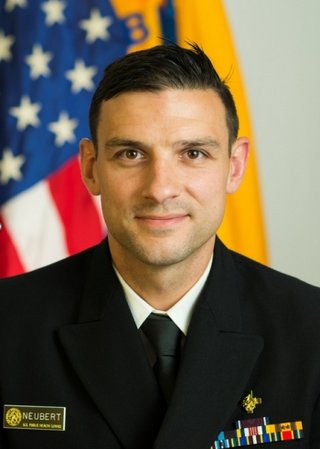Employee Profile: Patrick Neubert
The U.S. Department of Health and Human Services Office of Inspector General (HHS-OIG) recognized National Opioid Awareness Day on September 21, an observance intended to raise awareness about the effects of opioid misuse and reduce the stigma associated with it. As part of HHS-OIG’s multipronged approach to addressing the ongoing overdose epidemic, our agency helps to carry out the mission of the Opioid Rapid Response Program (ORRP). In HHS-OIG’s Office of Investigations, Commander Patrick Neubert has served as the ORRP coordinator since 2020.

Patrick explains that the ORRP works with state health departments to help mitigate overdose risks among patients who lose access to opioid prescribers due to events in their communities, such as clinicians’ retirements, voluntary closings of medical offices, and law enforcement actions. “ORRP is a partnership between public health and public safety,” Patrick stated. “The Centers for Disease Control and Prevention runs the program, and what they've done is set up trusted contacts throughout the nation. In every state, we have someone that we reach out to when an upcoming enforcement action is occurring, and it's usually to someone at the public health department and the behavioral health department. We give them a heads up in terms of an investigation, that something will be happening.” The purpose of these conversations is to alert health officials that patients taking opioids for chronic pain or medication for opioid use disorder may experience a sudden disruption to their care so that plans can be made to address patients’ needs based on states’ capabilities. Abrupt discontinuation of long-term opioid therapy can increase a patient’s risk of overdose, mental health crisis, and suicide. The notification process is essential to allow state health officials to implement risk mitigation for affected patients, depending on their capacity. In some cases, a mobile van is available to provide bridge care, or local recovery peer support professionals travel to the locations where services are discontinued to meet with patients and advise them on how to coordinate their care and seek new health care providers.
According to Patrick, the goal of the ORRP is one that resonates with him personally due to his professional experiences before joining the federal government. “We want [patients] to get better care across the board, either from a primary care physician, a pain management specialist, or a treatment provider.”
“I used to work as a social worker in an emergency room. For a person that came in requesting pain management or services of that nature, the physician would often not want to deal with that patient or not want to provide the treatment requested by the patient.” Physicians would, in many cases, presume that these patients were drug-seeking and intentionally describing their pain in a manner simply to obtain prescribed opioids. “[The institution] was not providing the empathetic care that patients probably needed at that point. I’ve come full circle on that. It's a challenging task, and we want people to receive the care that they need and deserve.”
Since leaving the emergency room, Patrick has spent 14 years as a member of the U.S. Public Health Service Commissioned Corps (USPHS) and working in the federal government, including HHS’ Health Resources and Services Administration and Centers for Medicare & Medicaid Services. He has deployed on numerous missions for USPHS to assist with natural disaster recoveries such as Hurricane Irma and Maria, COVID-19 response, surges of unaccompanied children entering HHS care, and Operation Allies Welcome. The importance of public service has been an ever-present concept in Patrick’s life since his early years.
While growing up in Cleveland, Ohio, Patrick’s father was an employee with the state’s Bureau of Workers Compensation in Vocation Rehabilitation. His mother worked for their county’s welfare division before becoming a teacher. In high school and college, Patrick frequently and enthusiastically engaged in numerous service learning and volunteer projects. “These are things that are important, serving the public and making an impact. And this is where I feel I can make a large impact,” he stated.
“I just really appreciate the opportunity to work in this [ORRP] space because it's an intersection between policy and public health, which I really enjoy, but also enforcement, which I understand from a decade of working fraud investigations at the Centers for Medicare & Medicaid Services. So this is kind of the perfect place for me.”
